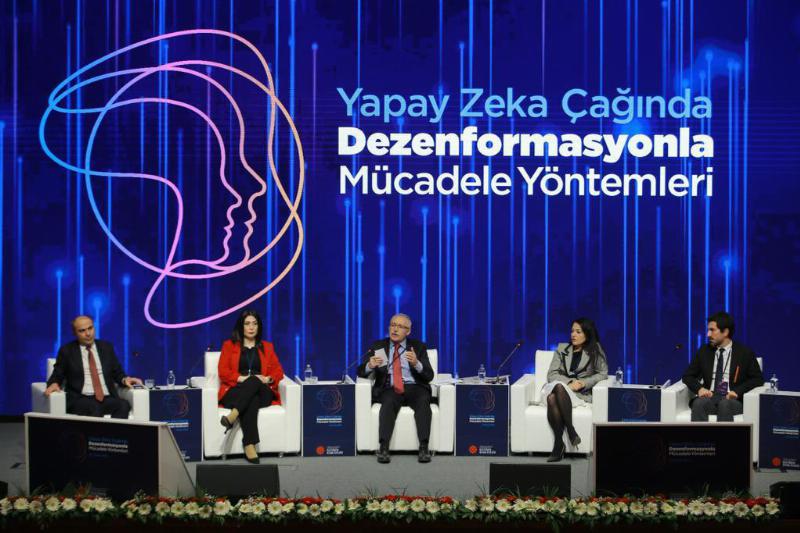Listen to the article
Experts Discuss Tech’s Role in Fighting Disinformation at Panel Event
Communication experts, journalists, and academics gathered to address the growing challenge of online disinformation and fake news during a recent panel organized by Turkey’s Directorate of Communications.
Idris Kardaş, Coordinator of the Center for Fighting Disinformation, opened the discussion by posing critical questions about technology’s role in combating false information. “How can we use technology in the fight against disinformation? Could artificial intelligence be effective for this purpose? How do social media algorithms spread disinformation?” Kardaş asked as he set the stage for the conversation.
The second session, also moderated by Kardaş, featured prominent voices including Assoc. Prof. Aylin Tutgun Ünal and Assoc. Prof. Başak Gezmen from Üsküdar University’s Faculty of Communication, alongside journalists Abdülkadir Selvi and Ömer Faruk Gökçin.
Assoc. Prof. Ünal highlighted the global regulatory landscape emerging to combat online disinformation. “Legal regulations covering social media channels were made in countries such as Germany, England, Australia, Russia, and China in previous years, and criminal sanctions are currently being imposed,” she explained.
Germany’s approach has been particularly stringent, with a law enacted in 2018 that requires platforms to remove illegal content within 24 hours and adequately report illicit activity. “Facebook was the first to be penalized in 2019,” Ünal noted. “The government fined Facebook 2 million euros for failing to adequately report illegal activity on its platforms in Germany.” The German law allows for maximum penalties of 5 million euros for individuals and 50 million euros for companies.
Beyond disinformation, Ünal pointed out that Germany has criminalized online stalking since 2017. Under Article 238 of the German Penal Code, individuals who harass, spy on, or persistently contact others, seriously restricting their lives, face fines or up to three years imprisonment—with sentences extending to five years for more serious offenses.
The tragedy of a 14-year-old girl who took her own life after viewing violent content sparked renewed regulatory interest in the United Kingdom. While still developing its approach, British legislators are considering expanding the authority of media regulator Ofcom to oversee social media platforms, with particular focus on removing harmful content related to violence, terrorism, cyberbullying, and child abuse.
Australia moved earlier, implementing two separate legal frameworks in 2015 and 2019 following a high-profile suicide case linked to cyberbullying on Twitter. The country established an eSafety Commissioner with authority to demand removal of content that humiliates or insults others. “It is foreseen that those who publish harmful content will be fined up to 60,000 euros, and companies that fail to remove this content within 48 hours face fines up to 300,000 euros,” Ünal said.
Addressing the motivations behind disinformation, Ünal identified attention-seeking, impressing others, and entertainment as key drivers. “In many news presented in digital media, disinformation is used today for purposes such as attracting attention, generating more clicks, and perception management,” she explained. The social impact of false information shared on social media can damage individuals, institutions, and even a country’s global reputation.
Search engines like Google also play a significant role in how information and perceptions are shaped. “Both search engines and social media channels influence a country’s position around the world,” Ünal observed. “Artificial intelligence algorithms can be used for good or bad.”
The panel concluded with Ünal emphasizing the importance of continued regulatory refinement and expanded digital media literacy education as essential components in the fight against disinformation in Turkey and globally.
Fact Checker
Verify the accuracy of this article using The Disinformation Commission analysis and real-time sources.




16 Comments
Social media algorithms and their role in spreading misinformation is a critical topic. Looking forward to learning more about the panel’s discussion on this.
Yes, understanding how algorithms can amplify false narratives is crucial. Thoughtful regulation and platform accountability will be important.
Glad to see a diverse group of experts coming together to discuss the role of technology in fighting disinformation. This is a critical issue that deserves in-depth analysis.
Curious to learn more about the specific legal regulations mentioned in countries like Germany, England, Australia, Russia, and China. Combating online misinformation is a priority globally.
The global regulatory landscape on social media and disinformation is an important topic to explore. Appreciate the panel’s focus on this complex challenge.
The role of social media algorithms in spreading misinformation is a concerning issue that deserves close examination. Appreciate the panel’s focus on this.
Interesting panel discussion on using technology to fight disinformation. Curious to hear Assoc. Prof. Ünal’s insights on the global regulatory landscape in this space.
Yes, legal regulations on social media channels seem to be a growing focus for many countries. Combating online misinformation is a complex challenge.
The panel’s exploration of the potential and limitations of AI in combating disinformation is an important discussion. Transparency and responsible development will be key.
Bringing together communication experts, journalists, and academics to discuss this issue is a valuable approach. Looking forward to seeing the outcomes of this panel.
Thoughtful analysis of the potential and limitations of AI in combating disinformation is important. Transparency and oversight will be crucial.
Interesting to learn about the emerging legal regulations on social media channels in different countries. Tackling online disinformation is a complex challenge.
Glad to see experts from various backgrounds coming together to address the complex challenge of combating disinformation in the digital age.
This panel discussion on using technology to fight disinformation seems timely and relevant. Curious to hear more about the global regulatory approaches mentioned.
The use of AI in fighting disinformation is a complex issue with pros and cons to consider. Glad the panel addressed this important question.
Absolutely, the potential of AI for this purpose needs to be carefully evaluated. Transparency and oversight will be key.